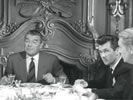Eye For Film >> Movies >> The League Of Gentlemen (1960) Film Review
Made five years after The Ladykillers, The League Of Gentlemen (no relation to those upstarts on television) has aged less well. There are times when the dialogue asks to be slapped (“Sit up, darling, and have some brekkie wekkie”) and for a classic British film of the period surprisingly short on laughs. However, the plot is made-to-measure and has been copied in one form of another repeatedly, even before the Rat Pack made Ocean’s 11.
Arriving near the end of the post-war stiff upper lip period, it remains loyal to the form, encouraged, no doubt, by the towering presence of Jack Hawkins, as Lt Col Hyde, the mastermind behind a sophisticated bank robbery. The whole thing is run on military lines and the seven gang members are chosen, not at random, but because each shares a blot on their copybooks – they were cashiered from the army.

It is this cast of characters that gives the film its iconic status. Nigel Patrick steps in for Trevor Howard as the smooth talking charmer, with a supercilious attitude towards authority; Roger Livesey is the fake vicar who sells illicit girlie mags on the sly; Richard Attenborough, in one of his cheeky chappie roles, works as a mechanic and is not averse to dodgy cash-in-hand jobs for neighbourhood villains; Bryan Forbes is the smartly dressed gigolo who treats women as cash cows and crime as a lucrative career move; Kieron Moore is the handsome, silent type who works as a trainer in a gym and maybe is gay (a word not used in homosexual parlance then); Terence Alexander is cuckolded at home by his seductive, glamorous wife (Nanette Newman, naked in the bath) and Norman Bird, as the bomb expert, is even more downtrodden in his private life.
Compared to 21st century action pictures, The League Of Gentlemen looks geriatric, but that is because it’s about personalities, planning and idiosyncracy. Hyde has spent more than a year working out the details of stealing the tin trunks of used notes that are delivered by a security firm every week to a bank in the City of London. His plan involves smoke screens, subterfuge, electrical malfunction and the minimum of force. Each member of the gang has a specific task and, being ex-military men, they are well-disciplined.
The film is consistently entertaining, partly because it is so English and makes no attempt to emulate Jules Dassin’s Rififi, the tense tale of a Parisian jewel heist, that came out in 1955 and was a universal success.
Certain characters are now defunct, like Bunny Warren (Robert Coote), an old chum of Hyde’s who turns up at the house after the raid, and these ex-army officers who retain the style of their rank without the money, or position, to make anything of it.
Hawkins and Attenborough stand out amongst a fine array of thespian talent and Basil Dearden (The Blue Lamp, The Ship That Died Of Shame) directs with quiet efficiency.
It’s not worth thinking about, but what would Michael Mann have made of this?
Reviewed on: 14 Feb 2007



















